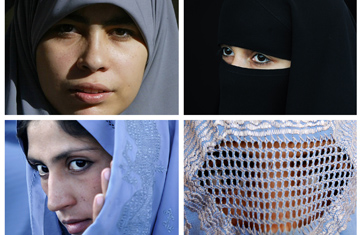
This combination of pictures shows Muslim women wearing various type of Islamic veils, a Hijab (top left), a Niqab (top right) a Tchador (down left) and a Burqa.
By ordering his cabinet to table a law banning the full face- and body-covering veils worn by some Muslim women, French President Nicolas Sarkozy appeared to signal that he has learned a precious lesson from the rout of his conservative forces in March's regional elections. But has he really? If taking aim at a visible and controversial symbol of extreme Islam in France is part of Sarkozy's new strategy of embracing causes most dear to win back the rightist voters who elected him, there is a risk that the move could appear to stigmatize Muslims. And it could blow up in his face — just as his controversial debate on French identity did before the ruling party's electoral pummeling last month.
On Wednesday Sarkozy instructed his government to draw up a law embracing the maximalist option that arose from months of discussion about the full veil among politicians and experts: a total ban in any public venue. Government spokesman Luc Chatel said the president had personally decided to go beyond the preference of many conservative lawmakers to only ban body- and face-covering garments — generically (if incorrectly) referred to as burqas in France — in state-owned public venues, like administrative services and schools, and on public transport. Instead, Chatel said, Sarkozy opted for an outright interdiction anywhere in public, arguing that the veils "are an attack on the dignity of women," and a provocative "symbol of a community's withdrawal and rejection of [France's] values."
Few people in France challenge Sarkozy's argument that, even when worn voluntarily, the full veils offends French values honoring the identity and rights of women. There's similar consensus that such visually arresting expressions of faith undermine French society's tradition of rigid secularity that keeps private religious beliefs out of public life. That view is shared elsewhere: Belgian parliament had been expected to vote through its own burqa ban on Thursday, which would have made Belgium the first country in Europe to prohibit the wearing of full veils in public. It only delayed that session when Prime Minister Yves Leterme handed in his resignation amid general political turmoil.
However, there is a division whether criminalizing a minority of women who wish to wear a full veil — lest they affront the sensibilities of the French majority — is, in fact, a violation of religious freedom. It's partly due to these concerns that support for a legal ban has been waning in recent months, with the most recent French poll in January showing 57% favoring a legal prohibition.
Similar resistance has grown among politicians, legal experts, sociologists and religious leaders despite their virtually universal hostility toward the full veil. Earlier this year, the Council of State — the independent body that advises French governments on the legality of policies — warned that any public ban on burqas risks being unconstitutional. Many conservative legislators favor a limited ban based exclusively on the potential security risks posed by letting people hide their identities in public. They say a more targeted prohibition would be more likely to clear constitutional hurdles and the international rights treaties that France has signed. Opponents of the law, including Socialist parliamentarian Pierre Moscovici, fear it will prove unenforceable — applying, as it does, to such a small number of women — and be viewed by France's estimated five million Muslims as another blanket swipe at Islam.
"We're talking about maximum 2,000 women, meaning this law risks reigniting conflicts between religions and communities," Moscovici told France Inter radio on Thursday. "I fear this law stigmatizes [Muslims], and fear it will be inapplicable."
So why is Sarkozy so hot for it? According to some observers, the new law is part of his reaction to the disastrous regional elections last month — where conservatives trounced in what many experts say was a proxy punishment of Sarkozy himself. The reason: traditional rightists who elected him president in 2007 are disgusted with the ideological incoherency of a leadership that often borrows ideas — and cabinet members — from the center and left. Since the March massacre, Sarkozy has hammered at themes dear to conservative voters, like reducing government spending, shrinking the number of state employees and continuing with reform. Just this week, Sarkozy staged a high-profile visit to a suburban Paris housing project that had recently been rocked by violent unrest to deliver a law-and-order promise to "harass delinquents."
Some pundits charge that Sarkozy's call for the introduction of an anti-burqa law is another gesture to alienated conservative voters and their concerns — this time over immigration and the increasingly multi-cultural nature of French society. If so, it's one that could yet prove risky. After all, though initially supported by a majority of people in polls, Sarkozy's November decision to order three months of national debate on France's identity eventually backfired on him.
Over time, surveys showed that most people regarded the initiative as a pre-election ruse to mobilize conservative voters to Sarkozy's side by casting immigrants and Muslims as potential threats to French society and culture. But all it did was contribute to the decision by vexed conservatives to abstain from the debate in protest over that initiative and other Sarkozy policy moves. That twist not only aided triumphant leftists, but also played a role in the renaissance of Jean-Marie Le Pen's moribund National Front party — and left French Muslims more than ever unwilling to be painted as France's scapegoats.
